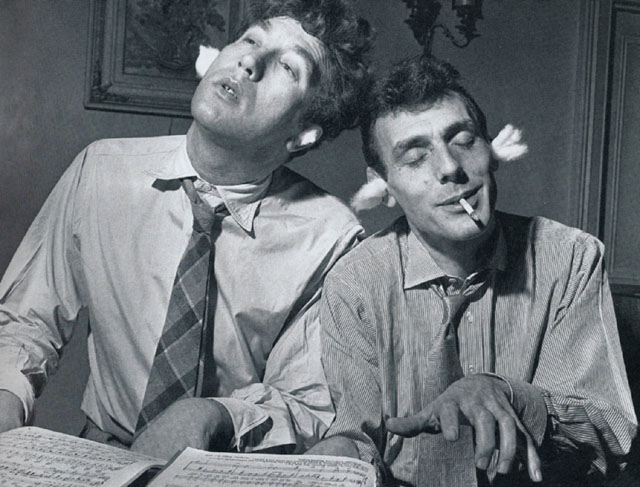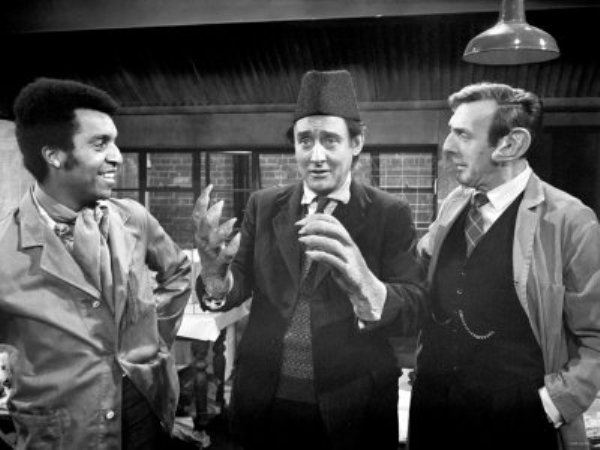In 1947 Eric joined the Frank H. Fortescue’s “Famous” Players and got one of his first jobs as a professional actor with The Darwen Repertory Company who were performing for a season at the Tudor Theatre in Duckworth Street. It was a hard and difficult task, putting on a show for six nights a week and trying to learn a new show for next week at the same time but it was a valuable lesson in improvisation. The season ran continuous from the beginning of April until the following February. Darwen just after the war was, as was most places, recovering from the conflict and as a result Eric describes the town in his autobiography as “barely a town, important primarily because it was on the main road from Blackburn to Bolton” but any discomfort from being away from home was soothed somewhat by finding digs at Harry Kershaw’s farm where the ration book was non-existent and every morning he was treated to “a breakfast of two eggs, bacon or ham and toast seared thickly with fresh butter” which Eric points out was “half-a-dozen people’s rations in one meal, and that was only breakfast”.
The farm was about twenty minutes walk from the Theatre and was described by Eric as “a purposeful, rangy old house surrounded by fields and meadows, with stables across the yard from the house and a huge byre, the winter quarters for Harry Kershaw’s Friesian herd until they were released to munch away the summer in one of the adjoining fields”
The run opened on the 7th April 1947 with “George & Margaret” and the shows included “Pygmalion”, “The House of Terror” & “The Shop At Sly Corner”
The staff of the Theatre where described by Eric as, “a lovely old gentleman in his middle seventies...(Mr Eric Norman) his wife, Dolly (Dorothy), about the same age, specialising in elderly duchesses...They were a kindly, gentle couple...” The others members in the cast were “a leading man and lady (Miss Pamela Mant who was later replaced by Miss Patrica Reed), an old actor, probably in his late eighties who played occasional parts, helped to change the set, ran errands, made the tea and was called Will Power and myself, the last member, known in repertory jargon as a jobbing actor.”
The plays that were performed were selected and directed by the actor-manager. Eric remembers the Theatre was not well attended “only a quarter full at best” but the company were competing with Cinemas whose admission charges were low for the time so they did well to keep their heads above water. In the local newspaper, The Darwen News, reviews were scarce, mainly concentrating on the amateur shows rather than the professionals but one review of “Little Women” did appear and fortunately does mention Eric...
The run was one of the longest repertory runs ever recorded in Darwen and lasted eleven months but the Theatre struggled on despite the scarce attendances and the final show “Facing The Music” concluded on the 9th February 1948 before it returned to showing films for one week before reverting to the stage.
Despite the meagre attendances the newspaper reported that “during their eleven months in the town they have created a revival of interest in stage shows and have won many friends and admirers”. In fact if you look closely at the above advertisment it claims that the Company has broken all records in Darwen. Positive support appeared regularly in the newspapers....
Once the run had ended Eric moved on to a new show in Warminster, Wiltshire. Looking back over his professional theatrical career Eric says that it wasn’t very inspiring but he never thought of giving it up and going back to a “normal” life and stuck at it until one day a chance meeting with an old friend, a phone call from Frankie Howerd and the rest is history...
Eric Sykes OBE, CBE - Comedy Legend
Eric Sykes was born in Oldham on 4th May 1923. Tragically his mother, Harriet, died in childbirth while giving birth to him. Ever since Eric has always maintained that his mother acts as his guardian angel. If this is true she’s done a great job as Eric is now one of the most popular and respected comedians that ever lived. He has had a long and distinguished career, working for and with, some of the greatest comedians ever, including Frankie Howerd, Tony Hancock, Spike Milligan, Peter Sellers, Hattie Jacques and more. He has had his own TV series, wrote his own novels and even appeared in a Harry Potter movie.
He picked up the acting bug during his stint serving in the army during the Second World War. Soon after he was de-mobbed he decided to seek fame & fortune in London. However, on arrival he didn’t have a plan of action and soon ended up in a cold, dreary bedsit with nothing to look forward to and no job. A chance meeting along the Embankment with an old Army friend, Flight Lieutenant Bill Fraser, who ran some of the shows during the war, changed his life forever. He paid him as a script writer which after a spell in theatre, led to him being asked to write for Frankie Howerd and soon found himself in demand as a comedy writer. Eric also wrote scripts for the radio ventriloquist show Educating Archie where he first met Hattie Jacques. He later teamed up with Spike Milligan and co-wrote scripts for 24 Goon shows

In the early 1950’s Eric made the successful transition from radio to TV, writing a number of series episodes and one-off shows for the BBC, mainly for Frankie Howerd. He made his first on-screen appearance in “Orders Are Orders” with Sid James, Tony Hancock & Peter Sellers. He later began to write for and appear in The Tony Hancock Show. It was about this time that Eric began to lose his hearing but learned to lip-read and watch his fellow performers say their lines in order to get his cues.
In 1960, Eric got his own TV show, entitled “Sykes and a...” written by himself and Johnny Speight (of Alf Garnett fame) and co-starred along with his old friend Hattie Jacques. The show was an instant hit and “Eric and Hat” became one of Britain’s most popular comedy partnerships. The show ran for nine seasons and 59 episodes and 34 of them are now believed to have been lost but one episode from the second series was made into a 45 minute colour short film, The Plank, with Tommy Cooper and is widely regarded as a comedy classic.
The 60’s also saw Eric on the big screen as well, including “Those Magnificent Men In Their Flying Machines” along with Terry-Thomas & Benny Hill. In 1969 came his most controversial series, Curry & Chips, which he co-starred with Spike Milligan who played a half/pakistani-half/irish man who comes to work in a British factory and rooms with his foreman, played by Eric. The satire on racial prejudice did not sit well with the Independent Broadcasting Authority who promptly cancelled the series after six episodes.
Also that same year Eric wrote, directed and performed in two short comedy films in the style of The Plank. “Its Your Move” was again a wordless slapstick comedy about a young couple, Richard Briars & Sylvia Syms, who were moving house and hire an accident-prone firm to help them, headed by Eric. It had an all-star cast including Tommy Cooper, Bernard Cribbins & Jimmy Edwards. The other short, “Rhubarb”, was drawn from the tradition that extras used to mumble the word “rhubarb” to simulate background dialogue. All the characters only spoke the word “rhubarb” all the way through and the cast included Hattie Jacques, Harry Secombe & Carry-On stalwart Kenneth Connor.
In 1972, seven years after “Sykes and a...” finished the BBC revived the series and re-named it “Sykes”. Eric and Hattie again played brother and sister living in Sebastopol Terrace and were re-united with fellow cast members Derek Guyler and Richard Wattis. Most of the shows were re-workings of the scripts from the 1960’s series but the show was even more successful than ever, running until Hattie died in October 1980.
Even as the TV show was running, film appearances continued, including “Theatre of Blood” with Vincent Price, "Shalako" with Sean Connery and “The Boys In Blue” with Cannon & Ball. After the “Sykes” series ended, Eric continued to write and appear in comedy shows, “The Likes of Sykes” and “If You Go Down In The Woods Today” & “Mr H is Late”. He also toured Australia with the play “Run For Your Wife” with Jack Smethurst, David McCallum & Katy Manning.
As he entered the 90’s, Eric reached the top of the charts but not as you would imagine as his voice can heard on the “Teletubbies theme” single which reached No.1 on the chart in December 1997. His voice is the one that says “Teletubbies” during the title sequence on the TV show.
Eric was awarded a CBE for his services to drama in the New Year’s Honours List, published in 2004 to go alongside his OBE which he recieved in 1986. He also appeared as Mollocks, the servant of Dr Prunesquallor in the BBC adaptation of Gormenghast which was notable for being the last time Eric worked with Spike Milligan before Spike died in 2002. He also appeared with Nicole Kidman in the 2001 film The Others and despite suffering a stroke in 2002 and undergoing heart bypass surgery, played Frank Bryce in the 3rd Harry Potter film “Harry Potter and the Goblet of Fire”.

Eric continues to work, even though he is now into his late eighties and now wears spectacles which contain no lenses but are actually a bone-conducting hearing aid. He married Edith Milbrandt in 1952 and they have four children, Catherine, Julie, Susan and David. He has also wrote a number of books, not only his autobiography “If I Don’t Tell It, Nobody Else Will” but fiction such as “UFO’s Are Coming Wednesday”, “Smelling Of Roses” and his first novel, “The Great Crime of Grapplewick”, which was supposedly inspired by his time in Darwen.
Eric has deservedly carved out a niche for himself as one of the comedy greats, his brilliantly written (and performed) comedy routines are as much loved today as they have ever been. It is timeless comedy which warms the heart of all of us and nobody does it better than Eric Sykes.
By Roger Booth with considerable thanks to Eric Sykes & Norma Farmes for permission to use photos and text from Eric’s excellent autobiography “If I Don’t Write It, Nobody Else Will”, published by Fourth Estate Books, 2005
back to top
Please see below for additional photographs regarding the Fortescue Players provided by Rosie Jones, December 2014. Will Power (Rosie's Grandfather) who appears in the photograph of "Little Women" at the Tudor Theatre was a member of the Fortescue Players. In its time, The Fortescue Players had 15 repertory companies and Rosie has received anecdotal evidence from a former actor who noted that scripts had to be committed to memory due to the fact that Mr Fortescue would not alllow actors the benefit of a "prompt".
© Rosie JonesThe Fortescue Players appearing in a production of "Little Women" at the Tudor Theatre in Darwen.
Eric Sykes is standing second from the left and Will Power is the gentleman standing behind the table.
© Rosie JonesThe Fortescue Players featuring Will Power (standing back row, second from left) at The Grand Theatre in Blackburn
© Rosie JonesSympathy note from Mr Frank Fortescue to Rosie's Mother
back to top

